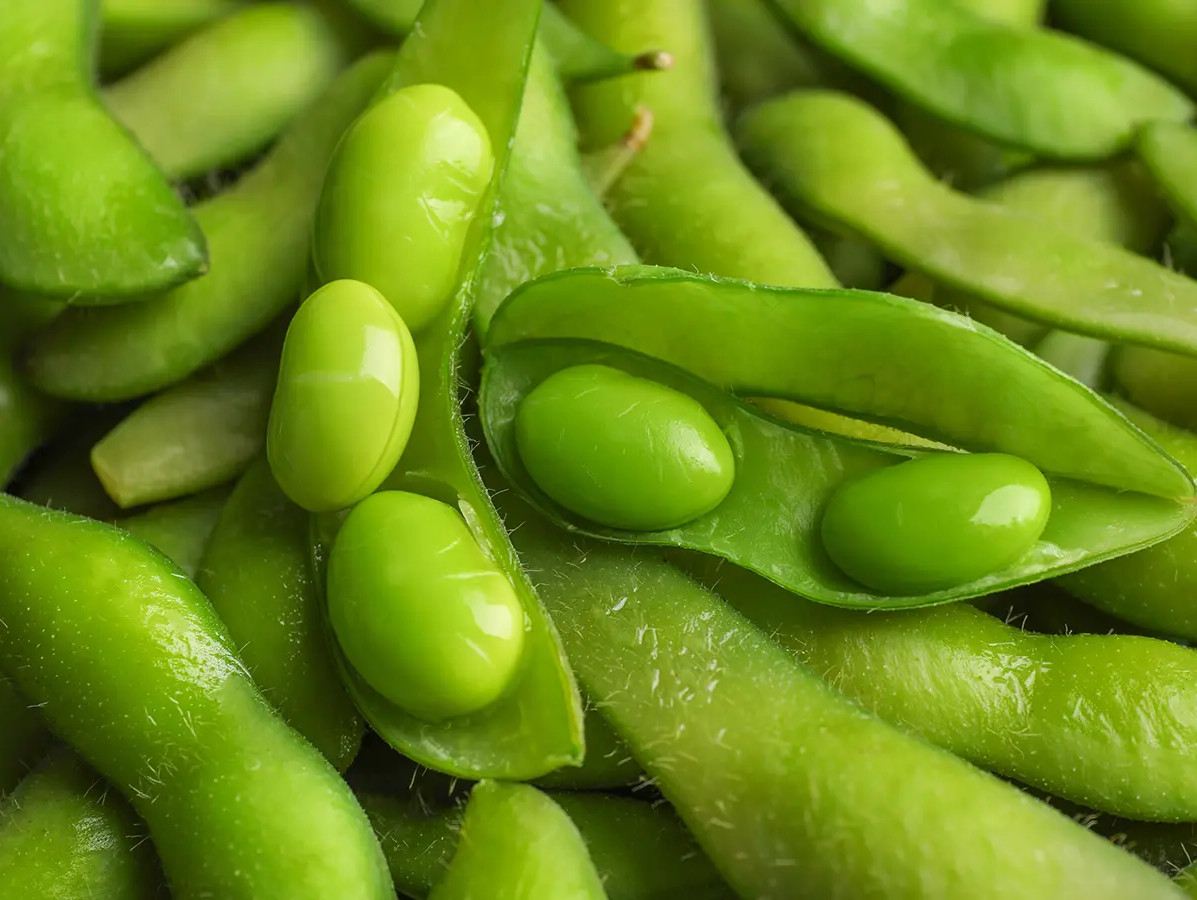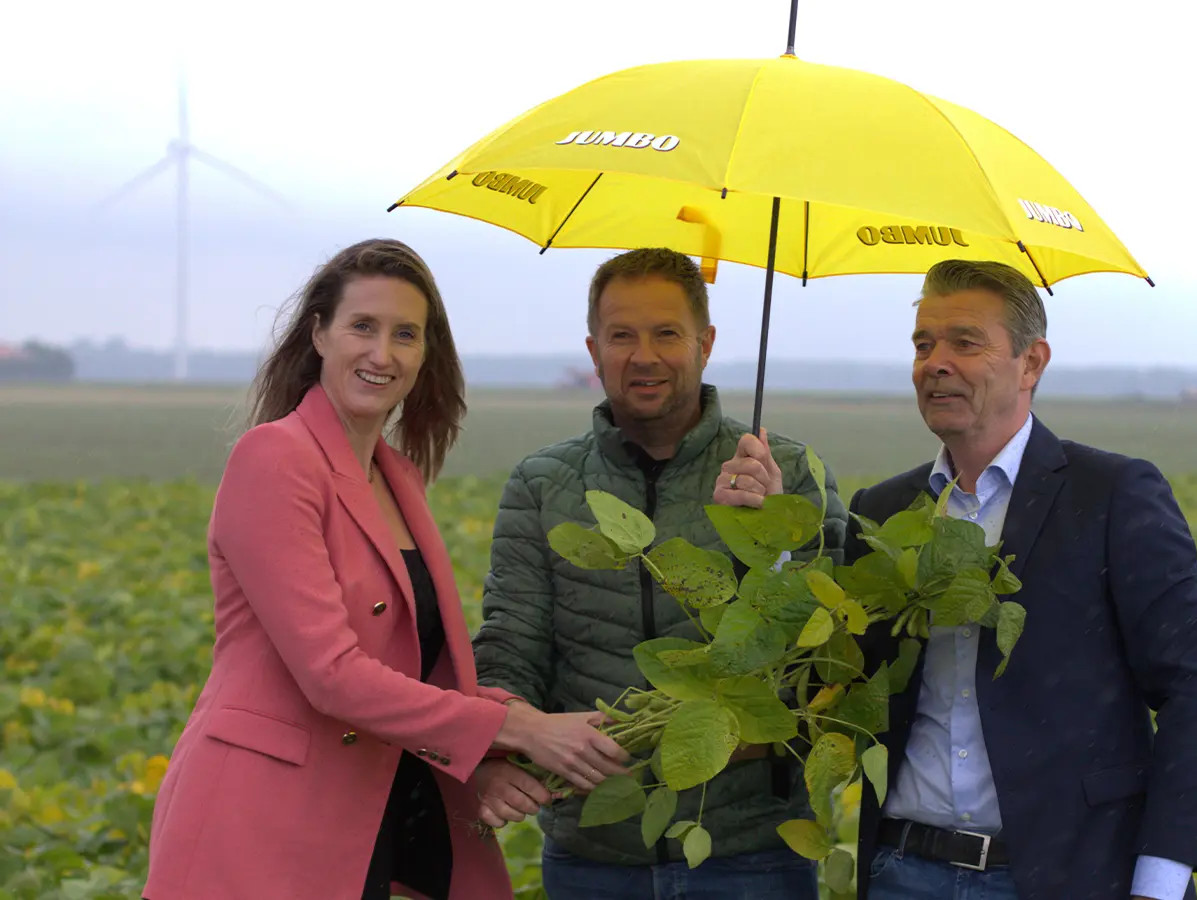
This story highlights the power of combining forces. Bart, Jeroen, and Jaimy have three very different professions but share a common mission: advancing plant-based, locally grown proteins with and for Dutch protein farmers. And it’s paying off.
Bart Grobben and his brother Tom founded ‘De Nieuwe Melkboer’ together. They produce a delicious yogurt using the soy they grow themselves. But how do you get that yogurt (and similar products) onto the plates of Dutch consumers? Jeroen Willemsen, Innovation Lead Protein Transition at Foodvalley, works with his team to support farmers like Bart and Tom in their search for sales channels. Meanwhile, Jaimy Franken, Senior Category Manager at Jumbo Supermarkets, strives to get more local and plant-based products on supermarket shelves.
We start this story right at the beginning of the chain—with Bart and Tom. The two brothers grew up on their parents’ dairy farm until it was time to spread their wings. Both lived and studied in the Randstad for a while. Bart explains: “We noticed that the market for plant-based dairy alternatives was quite mature. What stood out was that people were switching from Dutch cow’s milk to plant-based alternatives for sustainability reasons—or whatever other reason. But those alternatives mostly come from far away! That’s when the idea struck us: ‘Why couldn’t we do this locally?’ We wanted to continue the entrepreneurial spirit of our parents and initially planned to take over the dairy farm. But our business also had to fit the challenges of today.”
Seven years ago, they began growing soy. “Once we succeeded in that, we decided to use our harvest to make soy milk. We developed a tasty milk recipe, but the market for plant-based milk turned out to be quite large. We realized that yogurt alternatives could offer more added value, so that’s what we pursued.” It almost sounds like it was easy. For a few years, they ran both the soy cultivation and the family dairy farm together with their parents. “Over time, we realized that running two businesses at once was too much. That’s why, three years ago, we made the difficult decision to sell all our livestock,” Bart says. They didn’t make the decision alone; their parents fully supported it. “Being a farmer is also about being an entrepreneur,” he continues. “It’s about spotting opportunities. Continuing the dairy farm and making a good income for two families would have been a challenge. Besides the fact that our passion was not in that area, but in the plant-based field, the current developments and regulations made it uncertain whether we could succeed. When the cows left, it was a relief—we could focus. We converted the old barn into a production space for plant-based dairy.”
It took Bart and Tom a few years to get their soy to a quality suitable for the food industry. “There are many factors to consider,” the young farmer-producer explains. “How you cultivate, dry, clean, and store it. For the Dutch context, there wasn’t much knowledge available, and the information was fragmented. Dutch soy doesn’t differ much in taste from imported soy, but its protein content is a few percent lower. To achieve the desired protein content in our yogurt, we had to perfect the recipe from the start using Dutch soy. In the early stages, when our own harvest wasn’t sufficient, we sourced Dutch soy from other farmers.” Remarkably, De Nieuwe Melkboer uses the entire soybean in their recipe. They found a way to incorporate the fiber-rich pulp, okara, directly into the product, giving their yogurt both high protein and fiber content.
When asked what they would have done differently with today’s knowledge, Bart laughs: “I ask myself that sometimes too!” After thinking for a moment, he replies: “Starting from our own farm had its pros and cons. The advantage was having control, but the downside was figuring everything out ourselves. We were real pioneers. Every new phase in our business required different knowledge and expertise. Each time, we had to find the right people, which took time. In later phases, we formed partnerships with FrieslandCampina, Agrifirm, Foodvalley, and the Bean Deal. These were crucial steps that helped us get to where we are now.” Currently, the brothers are involved in a new project, Plant Protein Forward (PPF), an initiative by Foodvalley, Rabobank, and the Interprovincial Protein Council. PPF supports Dutch plant protein farmers and introduces consumers to tasty, sustainable, plant-based food from Dutch soil. As part of the initiative, four chain projects have been selected as pilots. The goal is to secure long-term sales channels for products from these chains. “We’re having constructive and promising discussions!” Bart says enthusiastically.

Jeroen Willemsen explains: “In recent years, various chain initiatives have been launched to bridge the gap between farmers and consumers and offer farmers new revenue models. But many of these initiatives get stuck at the step from cultivation to processing or, more importantly, from cultivation to sales. More and more farmers are considering growing protein-rich crops for human consumption, but they need certainty that they can sell their harvest at a profitable price. That assurance can only be offered to a limited extent, and without it they won’t take the leap. We aim to break that vicious cycle.”
The second goal of PPF is to shorten supply chains, giving farmers more control. “This can be done by reducing the number of chain links or helping farmers take on more chain management themselves,” Jeroen explains. “Bart and Tom control the entire chain, but it doesn’t have to be that extreme. For example, you could have a third party mill your crop while retaining ownership, allowing you to sell the flour yourself. This is a less drastic setup.”
How does it work? “Collaborating farmers submit a request for assistance to PPF. In the case of De Nieuwe Melkboer and the active soy growers behind them, the request was: ‘We want our yogurt made from Dutch soy to be sold by a major retailer. How do we do that?’ We then match them with someone with the right experience and expertise to guide them—the ‘chain booster.’ This person becomes part of the team for at least six months. Both the farmers and the chain booster receive fair compensation for their efforts,” Jeroen summarizes.
But it doesn’t stop there. Plant Protein Forward—born from the Bean Deal—applies the Entrepeneuring Apart Together (EAT) methodology to build robust, long-term partnerships. Getting a spot on the shelf is one thing, keeping it is much harder. “It’s not surprising that trust and mutual benefit are key to building such relationships,” Jeroen says. “Transparency is essential, particularly when it comes to fair cost and margin distribution.”
The challenge is that Dutch edamame, lupine, and soy are often more expensive than imported alternatives. Margins need to be adjusted somewhere in the chain to ensure consumers don’t face higher prices while farmers still earn a fair income. It’s not an easy task. Another challenge is that brands often have to pay for shelf space and promotions, while private labels don’t have this cost. “Entrepreneurs like Bart and Tom have worked hard to build their brand identity and don’t want to give it up easily. Without it, they’d become interchangeable,” Jeroen explains. “The challenge is to find an acceptable balance between private label and brand identity. The chain booster plays a supportive role here.”

“Farmers in these projects are bold enough to stick their necks out. They are true entrepreneurs, stepping into unfamiliar territory. They’re now negotiating with wholesale buyers and category managers from processors, wholesalers, and supermarkets. Learning this new business language is a collective challenge. It takes time. From experience, I know how challenging yet rewarding it can be when you strike good deals with the right partners at the right moment—luck also plays a role. The chain booster helps farmers navigate this new world. We share the knowledge gained with organizations like the Dutch Protein Farmers Producers Organization. This organization is expected to play a key role in securing deals that reflect the true value of Dutch-grown beans.”
While there are shared challenges, each chain also has unique opportunities and obstacles—this is the ‘Apart’ part of EAT. Jeroen elaborates: “Take lupine, for example. It’s a bean with a high protein content, appealing color, and complete amino acid profile. But like soy, it’s an allergen and unfamiliar to many consumers. So, we focus on partnerships with buyers who already know and use lupine. These partners don’t need to be convinced of its benefits and already list it on their ingredient labels. The only change is sourcing it from the Netherlands instead of Australia.”
Back at negotiating with the supermarket. “Edamame, lupine, field beans, and soy are attractive rotation crops due to nitrogen fixation, carbon buildup in the soil, and phosphate mobilization,” Jeroen explains. “Research by our partner Carbon Cloud shows that the footprint of Dutch beans is significantly lower than that of imported ones. This kind of data is useful in sales conversations. It offers a solution to the challenges retailers face, like complying with new regulations such as CSRD. We share our insights and trends with all the farmers in our project’s chains and help them incorporate the data into their pitches.”

Jaimy Franken (Jumbo) is eager to build on this. Not only will three plant-based yogurt varieties from De Nieuwe Melkboer be available in 300 Jumbo stores across the Netherlands starting February 17; from mid-March, Dutch edamame will be available as a frozen product in over 700 Jumbo stores in the Netherlands and Belgium. This is a first: edamame has never been grown and sold on this scale in the Netherlands before. “Sustainable supply chains are important to us,” she says. “Thanks to the long-term collaboration between Dutch Edamame and Jumbo—initiated by Plant Protein Forward—farmers have guaranteed sales, cushioning the impact of lower yields from other crops. Farmers receive a fair price, removing a major barrier to cultivation. This enables farms like Harry’s Farm in Flevoland to scale up their edamame production.”
Another advantage for the retailer is that regenerative farming practices are used to grow these edamame beans. This comprehensive agricultural approach focuses on restoring and improving ecosystem and farm health. Jaimy explains: “It goes beyond sustainable farming. It’s about actively improving soil health, increasing biodiversity, and enhancing resilience against environmental challenges. Practices include minimal soil disturbance, cover crops, and perennial plants. With this step, we’re contributing to the sustainability of our offerings and supporting local farmers. It’s also a new way to inspire customers to enrich their meals with a locally grown, healthy, and sustainable product. This fits perfectly with our ambition to offer more plant-based, sustainable products from nearby sources.”
This ambition excites Bart. “We also believe in local food. Transporting food over long distances just doesn’t make sense, especially when it comes to protein crops. In the Netherlands, we still don’t grow enough for human consumption; most of it is imported. We don’t believe in a black-and-white approach to animal and plant-based products—they can coexist, but the balance needs to be restored. Our goal is to build a local, plant-based chain for dairy alternatives, making local the most logical choice for consumers. How this will evolve isn’t set in stone. Maybe in ten years, there will be more chain boosters, or we’ll focus on finding the right farmers. And if we succeed in the Netherlands, who knows—our business model could become a blueprint for farmers looking to set up similar local chains abroad.”
Jeroen concludes: “We’ve been positively surprised by how effective this method is. The Plant Protein Forward pilot is already helping four crop chains expand their sales. We’re eager to start more chains. If our subsidy application, submitted in late December, is approved, we can double the number of chains and keep chain boosters involved longer as part of the team. The market for plant-based meat and dairy alternatives has grown tremendously over the past decade, but there’s still a long way to go in local cultivation. That’s our dream: advancing plant-based, locally grown proteins with and for Dutch protein farmers.”
Source: Vakblad Voedingsindustrie 2025